| SHADOWS ON THE WALL | REVIEWS | NEWS | FESTIVAL | AWARDS | Q&A | ABOUT | TALKBACK | |||||
 Shadows off the beaten path Shadows off the beaten pathIndies, foreigns, docs, revivals and shorts...
On this page:
AGA |
MEN OF HARD SKIN |
SINK OR SWIM
| |||||
| See also: SHADOWS FILM FESTIVAL | Last update 22.Sep.19 | |||||
|
Ága Review by Rich Cline | 
| |||||
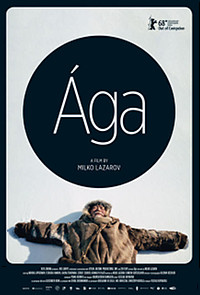 dir Milko Lazarov prd Veselka Kiryakova scr Simeon Ventsislavov, Milko Lazarov with Mikhail Aprosimov, Feodosia Ivanova, Sergei Egorov, Galina Tikhonova, Afanasiy Kylaev, Maria Spiridonova, Sandaara Tikhonova, Timur Savvin, Vlad Skryabin, Konstantin Lazarov, Teodor Fichev, Valeriy Gildebrand release US 27.Sep.19 18/Bulgaria 1h36 BERLIN FILM FEST |
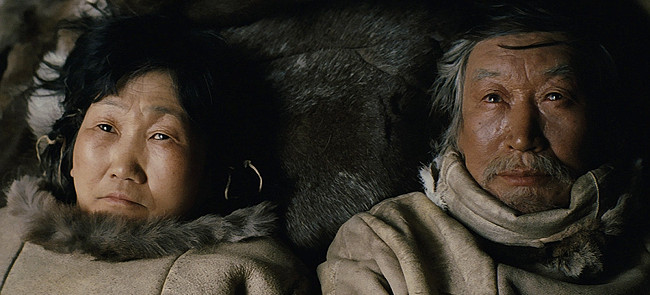 With a warm story in an icy setting, this offbeat Bulgarian film traces the day-to-day life in an isolated location at the top of the world. While much of the film quietly observes details in this white-on-white place, filmmaker Milko Lazarov gently allows a story to unfold in ways that almost silently convey the weight of the world. It's an transcendental movie that isn't easy to shake. Alone in a snowy ice field, Nanook and Sedna (Aprosimov and Ivanova) get on with life in their yurt, but the changing climate makes it difficult to hunt or fish. Their young friend Chena (Egorov) visits with news of the outside world, and as they reach an advanced age they are missing their daughter Aga (Tikhonova), who moved to the city years ago. As Sedna makes a new hat for Aga and argues that they need to forgive her, she is becoming increasingly ill. So Nanook sets out on an epic journey to find Aga. Visually, the film has a storybook quality, with rounded-corner frame, magnificent wide shots and involving long takes. And its universal themes make it feel like a timeless fable. In the evening Nanook and Sedna recount dreams or folktales, with evocative background music provided by a little radio. Dialog is in Yakut, a language spoken in Arctic Russia, which is the only hint about where the story is set. But the details of this couple's existence add a documentary-style kick, putting them into a realistic context, especially as Nanook ventures into the outside world. The actors are all rather deadpan, keeping their faces blank as they interact, letting ripples of thought play across their features. With minimal dialog, Aprosimov and Ivanova add lovely little touches to their interaction, including moments of wit and sparks of emotion. Egorov has the same low-key energy when he visits, chatting about Aga and their childhood before climbing back on his snowmobile and disappearing into the whiteness. And when she appears, Aga has the same presence, speaking without saying a word. Lazarov is depicting a fading way of life, vanishing due to both the global economy and man-made climate change. Landscapes are shot vividly, playing with ideas of scale, so as Nanook travels toward civilisation, the environment changes dramatically. And the people he meets are dramatically distant from his carefully held ancient culture and its powerful connection to the land and each other. The film's final scene is pure magic, beautifully shot and played to create a timeless parable.
| ||||
|
Men of Hard Skin Hombres de Piel Dura Review by Rich Cline | 
| |||||
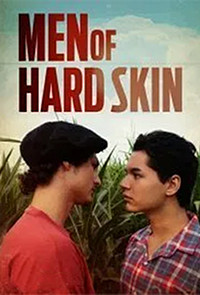 dir-scr-prd Jose Celestino Campusano with Wall Javier, German Tarantino, Claudio Medina, Juan Salmieri, Camila Diez, Pedro Meza, Malena Majul Lieun, Sergio Sarria, Mauro Altschuler, Estefania D'Anna, David Maldonado, Joel Maluenda release UK 14.Oct.19 19/Argentina 1h36  |
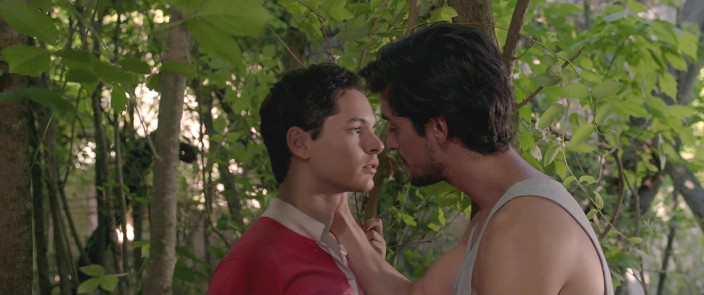 Taking an offbeat, almost unnervingly matter-of-fact approach to a seriously dark theme, this Argentine drama holds its focus tightly on the characters and never judges them. Which is simply astonishing. Filmmaker Jose Celestino Campusano gets under the skin with a complex, nuanced look into the lives of victims and perpetrators of child abuse. Avoiding sensationalism may make the film feel muted, but it has a lot to say, and its effects are lingering. On a farm in rural Argentina, teen Ariel (Javier) is in love with the local priest Omar (Tarantino), who has been abusing him and others since they were boys. Now rejected, Ariel turns his attention to farmhand Julio (Salmieri). But his father Pablo (Medina) will be furious if he finds out, so he gets help from his understanding sister Betina (Diez) and feral prostitute Zulma (Lieun), who also hooks Ariel up her cousin Ramirez (Sarria). Campusano's storytelling approach is disarming, filming scenes from offbeat angles, using long takes, wide shots, jarring zooms and vertical camerawork to keep the audience on its toes. As a result, the characters and situations refuse to be easily defined, which means that our moral compasses are compromised. It's rare for a film to be able to pull us in so tightly to such a provocative story, but Campusano manages to get us to identify even with the vilest characters in ways that are complex and thoughtful. Each actor adds to this sensibility, portraying characters without the usual stereotypical expectations. Javier is particularly strong in this sense, a boy (his age is unspecified) who often comes across as a grown man, so sure of what he wants and also capable of being a leader on his father's farm. Tarantino has the most difficult role as a sympathetic paedophile, a priest who gives in to his desires because they feel so natural to him, even as he knows he's wrong. His conversations with Meza, as Omar's equally transgressive mentor, are simply astonishing for what they reveal about the Catholic Church and its attitude toward child abuse. Everything in the film swirls around this theme, from Pablo's cruel homophobia to Ramirez's fury when he hears that Ariel goes cruising for sex. And these heavier moments are skilfully balanced by some hilarious asides (Lieun is a scene-stealer) and lovely emotional authenticity. So while the film feels mannered and almost shockingly casual about its central topic, it's also gnawingly involving with an unexpected emotional kick.
| ||||
|
Sink or Swim Le Grand Bain Review by Rich Cline | 
| |||||
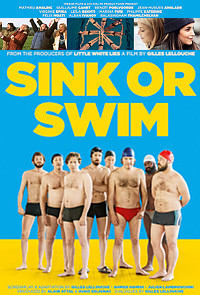 dir Gilles Lellouche prd Alain Attal, Hugo Selignac scr Ahmed Hamidi, Julien Lambroschini, Gilles Lellouche with Mathieu Amalric, Guillaume Canet, Benoit Poelvoorde, Jean-Hugues Anglade, Virginie Efira, Leila Bekhti, Marina Fois, Philippe Katerine, Felix Moati, Alban Ivanov, Balasingham Thamilchelvan, Jonathan Zaccai release Fr 24.Oct.18, US 27.Sep.19 18/France 2h02 CANNES FILM FEST |
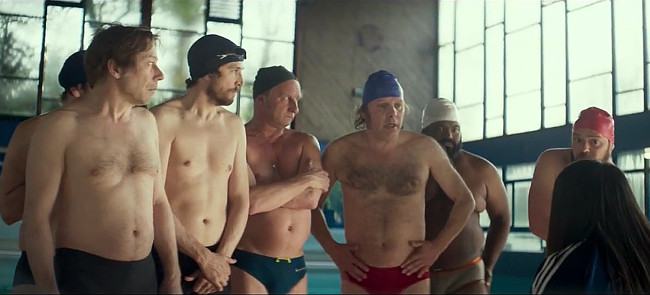 Slightly more serious-minded than the 2018 British comedy Swimming With Men, this is a French version of the same true story about middle-aged men facing depression with the help of a synchronised swimming club. This version touches on big issues in dramatic scenes, even if it only skims the surface. But the decent set-up soon gives way to the usual silliness, with various capers leading to an underdogs-against-the-world climax. Fed up with bad job interviews, Bertrand (Amalric) feels utterly inadequate around his wife (Fois) and three kids. Then at the pool one day he discovers a group of middle-aged men learning synchronised swimming. The tough coach is young Delphine (Efira), and the amateur group has differing abilities and motivations, but each of them feels cast aside by society. When they discover that there's a world championship coming up in Norway, they decide to go for it. Not because they have a chance of winning, but because they need something to aim for. Each of these men has his own troubles in life. Laurent (Canet) is worried about his teen son, the pool's owner Marcus (Poelvoorde) is deep in debt, Simon (Anglade) is a rocker who never quite made it, Thierry (Katerine) is a lonely guy who virtually lives at the pool. These and other things are brushed past to make way for more comical montage sequences, as they are put through their paces by fierce new trainer Amanda (Bekhti), shouting them into shape from her wheelchair. Without a proper central figure, performances by this eclectic ensemble are relaxed and realistic, with nicely prickly edges to them. There's a real sense that these men are struggling with their daily lives, feeling inadequate on several levels as they try to find even a hint of success in their professions. This makes them likeable losers. But without something like a sharp edge or frisky sexuality, these characters never become terribly vivid. Even so, this is a solid feel-good movie, even if it's oddly unambitious and stretched out longer than necessary. Lellouche directs the film with a strong sense of the characters, although there isn't much style to it, even with the skilful wide-screen camerawork. And setting family fistfights to jaunty music is a bit much. But at least there are nods to bigger themes along the way. And the basic plot is irresistibly engaging, especially in the end when we finally get to see them swim.
| ||||

See also: SHADOWS FILM FESTIVAL © 2019 by Rich Cline, Shadows
on the Wall
HOME | REVIEWS | NEWS | FESTIVAL | AWARDS
| Q&A | ABOUT | TALKBACK | | ||||



